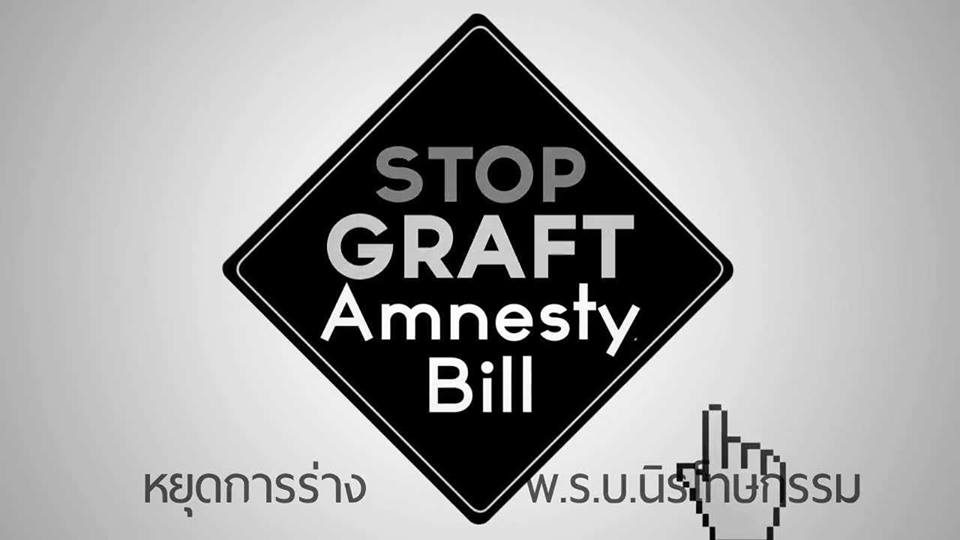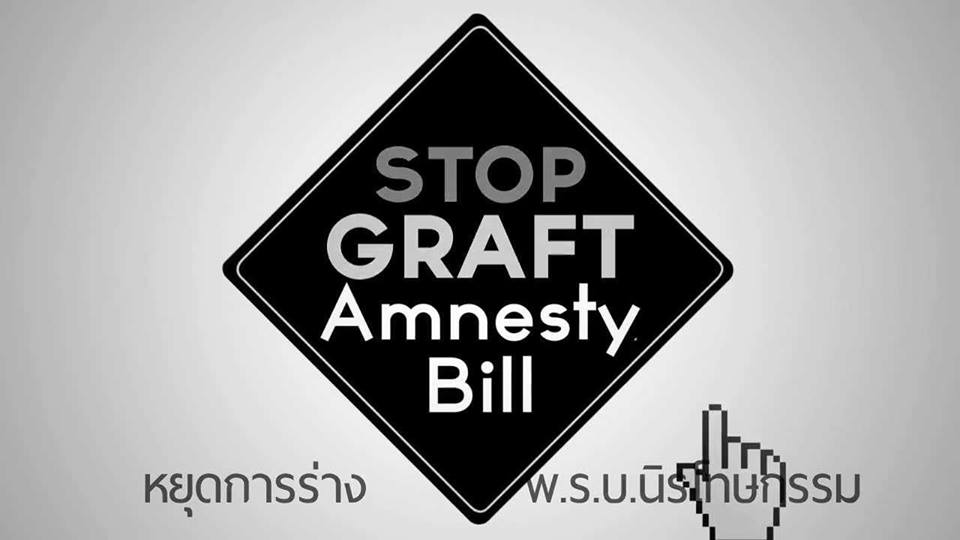“Those who tell the stories rule society.” тАХ Plato
The current situation facing Thailand is, perhaps, one of the most crucial in the political history of the country. After 6 years in exile, deposed former Prime Minister Thaksin Shinawatra and the Pheua Thai government have sought to push through the amnesty bill. The draft of the bill provoked objections from many groups of people. The most active is the anti-Thaksin group, which has been rallying in Silom and Ratchadamnoen Roads. The draft also upsets the Red Shirts, as passing it will allow the political leaders who ordered killings in the violence of May 2010 to be free. The worst is that this bill does not include the political prisoners who were prosecuted by Article 112 during the political events after the 2006 coup. This “awakening” of dissent obviously signals to Thaksin, Yingluck, and their Pheua Thai party that they need to reconsider whether they should continue their attempt to pass this bill.
The movement to protest the bill seems to be unified. But if we look closely, this ‘all-for-one’ movement has various purposes and political stances. Since the bill has passed through the House, the people in the public and online media who oppose the bill have adopted a black diamond-shaped sign saying “opposing the bill…” (Khadkhan PorRorBor…). The sign also has different variations depending on the emphasise of the group involved. Apart from the prompt use of the sign, many social units and organisations have started to publicise their views in the form of open letters. Typically, the format of these opposing letters contains background information on the reviewing process of the bill, the rationale for opposing it, and occasionally a suggested solution.
What is interesting to me though is that when reading carefully their rationales for opposing the bill, something fascinating appears: what we thought of as being a unified movement among these open letters is, in fact, mistaken. Each of the letters employs different wording, revealing the differences in their actual political agenda in opposing the bill. The following is the result of my close-reading and content analysis of these letters, which I have summarised in a qualitative format, and which I hope will be easy enough to understand. One thing to note is that, in reality, these open letters might not represent every voice of the members of each group. Yet, they contain sufficient details that the members of each group would agree to willingly put to their names to the stance.
Before I go on to show my results, I would just like clarify the terms and the categories used in this examination. In the result, I group the Thai words and phrases in the opposing letters into different generic categories. For example, any phrases that relate to objecting to the bill because of Thaksin and his corruption cases would be defined as “Thaksin/corruption.” The same goes with “conflicting with the first review,” which signifies the phrase that specifically means that the bill is unconstitutional. Moreover, I have also come up with the names which describe the semantic characteristics of these opposition reasons. They can be classified into the three broad categories as follow.
- “L” is for legislative procedure-related reasons (examples: “conflicting with the 1st review of the bill,” or “conflicting with other bill in the constitution”)
- “P” is for particular social reasons (examples: “Thaksin/corruption” or “ignoring the 112 prisoners”)
- “G” is for broad and general reasons (examples: “against the rule of law” or “against the principle of democratic governance”)
The reason for coming up with these generic codes is to help determine the hidden political agenda of each group. Understanding the political agenda of each group is necessary. Today, it seems that every group who opposes the bill seems to be catching the same train of “opposing-the-bill” although they have different political agendas hidden underneath. Knowing or, at least, getting a sense of what each group wants out of this train will allow us to understand the current situation. In reviewing the hidden agendas, I refer my verdicts to the general political goals pursued by the major political movements: “against Thaksin,” “pro-victims,” “moderate,” and “safe-play.” The latter two are different in the way that the first one, “moderate,” is the letter which expresses a specific concern arguably equal on all sides, where as “safe-play” are the letters which express in a “blanket style,” using broad words to cover everything.
Ok. Enough talking. Here are the results.
1) “578 Thammasat University’s Academic Staff”
Thaksin-corruption cases (P)/too broad content (G)/conflicting with ‘the amnesty bill’s principle’ (did not identify which principle)(G)/conflicting with the law of the state (phidlak-nitirad)(G)
Verdict: against Thaksin
2) “Administration Board of Chulalongkorn University”
Conflicting with the first review (L)/freeing the political leaders (P)/ Thaksin-corruption cases (P)/ too quick legislative procedure (G)/ and conflicting with the amnesty bill’s principle (by Kor Or Por)(G)
Verdict: moderate
3) “Chulalongkorn University’s Student Association”
Conflicting with the first review (L)/ and against the rule of law (phidlaknititham) (G)
Verdict: moderate
4) “Academic Staff of the Faculty of Law, Chulalongkorn University”
Conflicting with the first review (L)/ unconstitutional (with an example of the wording in the bill (L)/ too quick legislative procedure (G)
Verdict: moderate
5) “The Student Association of Kasetsart University”
Freeing the political leaders (P)/ Thaksin-corruption (P)/ freeing those who burned and destroyed public assets in the political up-rises (P)/ too quick legislative procedure (G)/ conflicting with the law of the state (against the previous verdicts made by the post-Coup courts)(G)
Verdict: moderate (with a bias against the Red Shirts)
6) “Chiang Mai University Community”
Against the principle of democracy (G)/ ‘the unfair majority’s rule’ (phadedkansiangkhangmak)(G)/ lack in legitimacy (G).
Verdict: safe-play
7) “Student Union of Chiang Mai University”
Too broad content (G)/ too quick legislative procedure (G)
Verdict: moderate
8) “General Students in Chiang Mai University”
Freeing the political leaders (P)/ Thaksin-corruption (P)/not including the 112 prisoners prosecuted during the political events (P)
Verdict: moderate
9) “Prince of Songkla University”
Conflicting with the first review (L)/ freeing the political leaders (P)/ freeing the post-coup organisations (P)/ freeing the criminals in the three southern provinces (P)/ too quick legislative procedure (G)
Verdict: pro-victims
10) “Labour Union of King Prajadhipok’s Institute”
Thaksin-corruption (P)/ too broad content (G)/ against the Law of the State (G)
Verdict: against Thaksin
11) “Association of the University Presidents of Thailand”
Thaksin-corruption (repeated about 5 times in 2 paragraphs) (P)
Verdict: super against Thaksin
12) “Nitirad”
Conflicting with the first review (L)/ freeing the political leaders (P)/ not including the 112 prisoners prosecuted during the political events (P)/ too broad content (G)/ and offering to undo the post-Coup legal actions (S-solution)
Verdict: concern about the victims (and the coup)
Apart from these groups who wrote open letters to oppose the bill, there are others who also did the same, yet do not either oppose or support the bill. “The Student Association of the Faculty of Political Sciences, Chulalongkorn University” is one of them. These students at Chula wrote to welcome and support any political movements that wish to use their association as an outlet or platform to voice their opinions or to debate about the issue.
At the moment (8 November 2013), the seemingly unified movement to oppose the bill is still on-going. It is also likely that there will be more open letters from other groups published as the protest continues. Certainly, the assessments I have made of the political stance of the aforementioned groups are not absolute, and may not be applied to the thinking of everyone in each of the organisations. However, these verdicts at least tell us about a more specific political agenda of various institutions which at the moment come together in one massive political movement on the streets of Bangkok. Let’s wait and see whether their different ideologies will matter for their opposition, or even for their cohesiveness as a general “opposing the bill…” group?
Let’s make a stand to keep a close watch on the current situation and hope that, soon, the light will shine through.
Pasoot Lasuka is a PhD student at the School of Culture, History, and Language in the ANU College of Asia and the Pacific.
 Facebook
Facebook  Twitter
Twitter  Soundcloud
Soundcloud  Youtube
Youtube  Rss
Rss 
